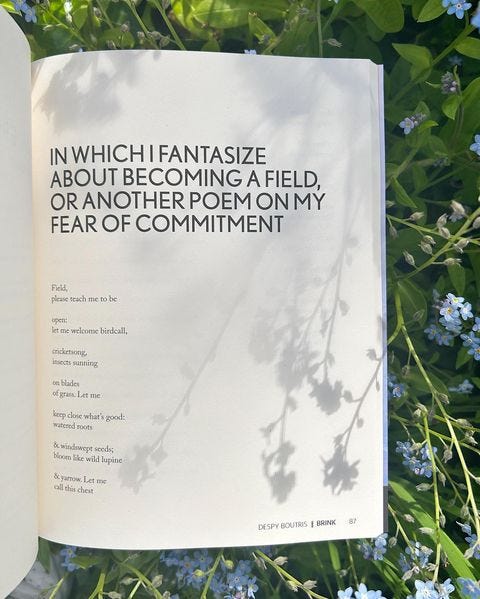Happy Monday!
Here’s what I have for you today:
Housekeeping
A quick workshop tip
Opportunities
To-read
Quotations
Tweets
Housekeeping:
In personal news, I had a long interview with Existere Literary Journal, and you can watch two minutes of it here!
I have three poems out in Brink this week:
& the third.
I also have some art on the front & back covers of Bat City Review.
& so many writers I admire are in there!
Finally:
(I know, I’m almost done talking about myself, I promise.)
I was given an honorable mention from Zócalo Public Square for their poetry prize (again!). You can read the winning poem here.
How to give meaningful workshop feedback:
Ask yourself (or the writer!) what they’re trying to accomplish with their text.
Determine how well the text accomplishes their goal.
Clarify how they could revise the content & form of the text so that it’s more in-line with that goal.
Make note of what craft elements they could utilize/improve on to help serve their goal.
Back when I was leading workshops at the University of Houston, I tried to remind my students to bear these ideas in mind when commenting on each other’s work. So often (especially in undergrad workshops), students base their comments on how well they “liked” the text—or how in-line it was with their personal poetry/fiction interests. As you can imagine, that can quickly become problematic! And it rarely makes for a positive workshop experience. Obviously, craft—and form—is inseparable from content, but: you can comment on form within the context of the writer’s specific goals for their work. And, for the sake of the writer—and their work—you should do that.1
Opportunities:
Velvetpark – LGBTQ+ Visual Artist Residency: This residency is open to LGBTQ+ visual artists at any point in their careers. The resident will receive six months of studio space in Brooklyn to develop and complete a body of work. The application fee is $25. Deadline: May 12, 2023 | velvetparkmedia.com
To read:
Quotations:
The German philosopher Arthur Schopenhauer believed music to be the best artform in part because he saw it as a pure expression of the will and therefore the purest relief from it (I’m paraphrasing, perhaps poorly). Like, we are forever at the behest of our various biological needs/desires and when we are engaged with art, most of all music, we are able to escape those drives for a while.
The punk part of me will always bristle at prescriptive definitions2, while also yearning for them! I resent the yearning!
Written language is an arbitrary representation of speech, which is a mostly arbitrary abstraction of meaning.
I am an American author writing openly about (predominantly queer) sex in 2023—a prudish, homophobic moment even for a famously prudish, homophobic nation. I think writing about sex has never been more necessary, or more terrifying.
All the work you must do is entirely personal.
If the erotic lives of your characters are important to you for a particular project, or all your projects, then that is what you must do. Regardless of what people you know (or don’t know) say (or might say) or think (or might think). So I think the first step here is acknowledging that what you want to do is not excessive, unnecessary, perverted, indulgent—unless it is all of those things, because congratulations, some of the greatest art is excessive, unnecessary, perverted, and indulgent. I welcome you and your obsessions and fantasies and mysteries, and wish everyone who engages in Discourse about how sex scenes are unnecessary a very terrible Monday.
I think about people I know reading the sex scenes I’ve written the same way I think about people knowing I’m gay. Both are fundamental parts of my life and practice that are necessary to understanding me, but I also do not exist to be understood by every human being who crosses my path.
Tweets:
I can’t embed tweets anymore because Elon is an a**hole, but here are links to a few.
Have a great week—
-Despy Boutris
Instagram
Twitter
Website
Shop
I’m sure you know this already, but just in case.
same






